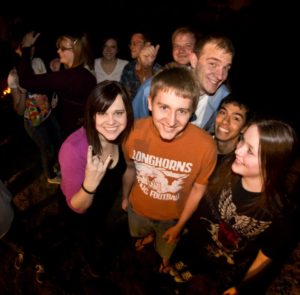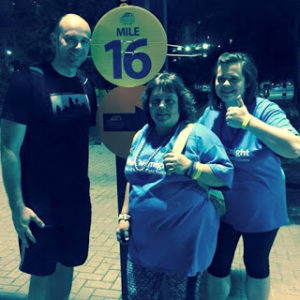Nothing in my life prepared me for the moment I lost my best friend to suicide.
It was a Saturday morning, 8 a.m. on May 12, 2012 to be exact, when I received a phone call from an unknown number. The person on the other end told me my best friend was gone.

His name was Nathan Duncan.
He was more than my best friend, almost a brother. He was my should to cry on after a bad day, the boy I ran to when I had a good news to share, the person I spent endless hours with riding in his car talking about the girl he adored and the boy who broke my heart. We laughed, we joked, we made memories at four in the morning, and he is now someone I miss greatly on a daily basis.
Nathan dealt with depression, unknown to me until a few days after his death. He never talked about it; he mostly just laughed and smiled with our friends. He never seemed sad, he was tired often, but mostly we stayed up late watching Netflix, playing games at our local arcade, and making plans for future road trips. I never expected anything was wrong. I never thought he was dealing with sadness on a daily basis. However, the truth was he was dealing with something so personal, so dangerous, and I wish more than anything he had just talked to me.
I didn’t know much about depression or suicide until I lost someone close. I never met anyone who had been vocal about their battle with depression. So I did research, and I discovered American Foundation of Suicide Prevention, an organization that raises awareness of suicide and prevention. Through AFSP I found others who had lost family members and friends to suicide. I also discovered stories of those who were battling depression. I soon attended group therapy, which was a healing moment for me. I discovered those I could relate to and who shared my same pain.
I walked away from therapy knowing I wanted to fight suicide. I never wanted anyone to experience the pain Nathan went through and the pain I went through after losing him. Through out the next few years I became a Field Advocate fighting for laws in support of mental health to get through Congress, and I also participated in multiple community walks in Salt Lake City, UT and Dallas to bring awareness to suicide prevention and raise money for the cause. Because of being involved, I know there are thousands of others fighting the same cause.
Together we can make the the difference in those who struggle on a daily basis.
According to AFSP, suicide warning signs include:

If a person talks about: Being a burden to others, feeling trapped, experiencing unbearable pain, having no reason to live, or killing themselves.
If a person’s behavior includes: Increased use of alcohol or drugs, looking for a way to kill themselves, such as searching online for materials or means, acting recklessly, withdrawing from activities, isolating from family and friends, sleeping too much or too little, visiting or calling people to say goodbye, giving away prized possessions, or aggression.
People who are considering suicide often display one or more of the following moods: Depression, loss of interest, rage, irritability, humiliation, or anxiety.
When you see signs and risk factors in friends or family members, don’t hesitate to reach out for help. Sometimes preventing suicide is reaching out to others and having uncomfortable conversations.
Here are a few tips on when talking to a suicidal person from Helpguide.org:
Be yourself. Let the person know you care, that he/she is not alone. The right words are often unimportant. If you are concerned, your voice and manner will show it.
Listen. Let the suicidal person unload despair, ventilate anger. No matter how negative the conversation seems, the fact that it exists is a positive sign.
Be sympathetic, non-judgmental, patient, calm, accepting. Your friend or family member is doing the right thing by talking about his/her feelings.
Offer hope. Reassure the person that help is available and that the suicidal feelings are temporary. Let the person know that his or her life is important to you.
Take the person seriously. If the person says things like, “I’m so depressed, I can’t go on,” ask the question: “Are you having thoughts of suicide?” You are not putting ideas in their head, you are showing that you are concerned, that you take them seriously, and that it’s OK for them to share their pain with you.
Don’t argue with the suicidal person, don’t acted shocked, don’t promise confidentially, don’t offer ways to fix their problems, and don’t blame yourself. You can’t fix someone’s depression, or your loved one’s happiness, or lack thereof, is not your responsibility.

Most of all, respond quickly in a crisis. Talk to a parent, police officer, teacher, church leader, or an authoritative leader who can help your friend or family member to receive the help that is needed.
If you are reading this right now, and you are having depression or suicidal thoughts, go talk to someone right now. You are not alone. People care about you. You are loved and there are people who understand. Please, don’t hesitate to reach out for help. If you are in a crisis, please call the National Suicide Prevention Lifeline at 1-800-273-TALK (8255).
More than anything I wish I had that conversation with Nathan.
I made a promise to Nathan a week after he died that I would never let the world forget who he was. He was the person who we should all strive to be – understanding, kind, loving, funny, patient, and just terrific. And that is what I will strive to be: more understanding, kinder, more loving, more patient, and I’ll make more jokes. I’ll make sure I am the friend Nathan was to me, because that way every person I meet will know him and his legacy will continue on.








